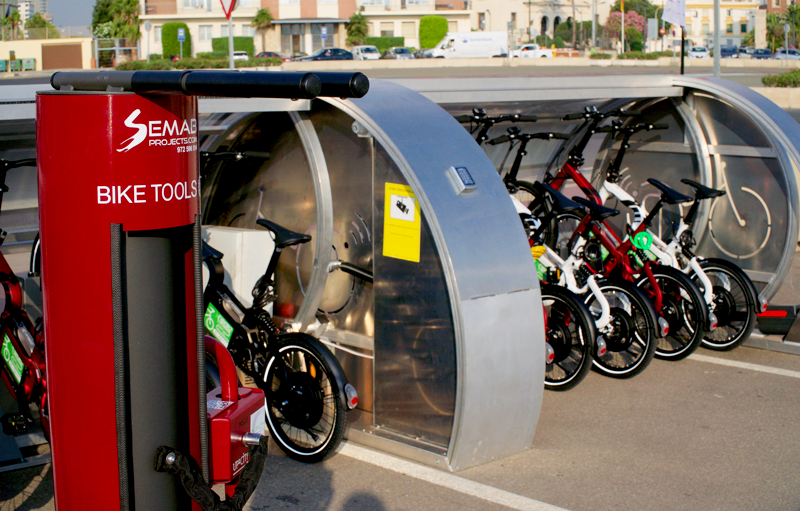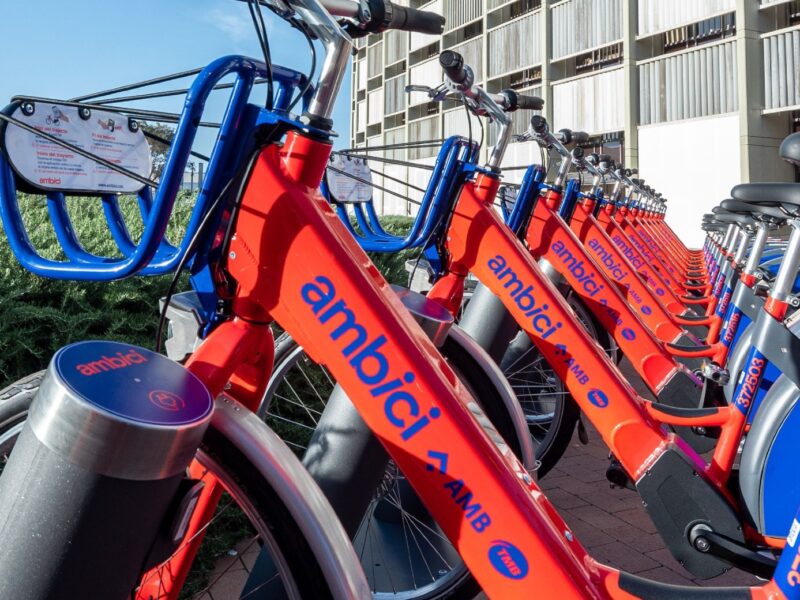MOBILITY
E-bike-sharing system development in Valencia
As part of the SUMPORT project, this pilot action has introduced a bike-sharing system for cruise passengers arriving at the Port of Valencia. The objective is to allow wider environment-friendly mobility options among the port and the city.
Challenges addressed
- Mobility problems related with port activities.
- Traffic congestions.
- Air and noise pollution.
Main objectives
- Connect the port with the city in a sustainable way.
- Promote bikes as an alternative to conventional means of transport (coaches, busses, taxi, etc.).
- Provide better service to multiply users.
- Reduce pollution and traffic congestions.
Facts
Project type Sustainable mobility
Promoter SUMPORT Project
Collaborators Valenciaport Foundation & Port Authority of Valencia
Start date 2018
Funding Interreg-MED
Website sumport.interreg-med.eu
Project description
This activity has consisted in installing an e-bike-sharing system in the Port of Valencia.
MED cities having ports are challenged with even more complex issues, needing a long-term mobility planning approach, integrating both city- and port-originated transport flows, in order to achieve sustainable urban mobility.
Valenciaport Foundation introduced an e-bike-sharing system intended for ferry and cruise passengers arriving at the Port of Valencia. The goal was to provide a wider range of environment-friendly transport options beyond conventional fossil-fuelled vehicles. Therefore, 10 e-bikes have been made available in an autonomous and automatic parking system where they are charged with solar energy. Cruise passengers that can rent them using an intuitive app.
SUMPORT’s efforts, however, has not been entirely successful: experience showed that cruise passengers tend to prefer organizing the visit of the city in advance, using the options offered on-board. This shows that preliminary agreements shall be made with cruise operators in order to spotlight alternative opportunities. To maximise the use of the proposed solution and ensure its long-term sustainability, the use of the e-bike sharing system has been extended to persons working in the port area as well.
SUMPORT PROJECT
SUMPORT aims to increase the planning capacities on sustainable mobility of port cities through training activities and exchange of experience.
Apart from the similar challenges that EU cities face, MED cities having ports are confronted with even more complex issues, needing a long-term mobility planning approach, integrating both city- and port-originated transport flows, in order to achieve a sustainable urban mobility.
The main objective is to increase the planning capacities on sustainable mobility of port cities through training activities and exchange of experiences.
The principal outputs of the project are: (a) Conducting trainings for MED port city officials in drafting SUMPs, also benefiting from MED port cities already having them (b) Drafting SUMPs in two MED port cities and updating one already existing (c) Implementing pilot actions and small-scale investments for sustainable mobility in six MED port cities (d) Implementing an e-learning platform for transferring project’s results.
RELEVANCE
Cities having ports face some extra problems adding a greater degree of complexity within the urban mobility. This project attempts to improve the planning capacities of the cities in order to face this issue in better conditions.
Impact and results
- 1 bike rental station
- 10 e-bikes
- Pollution and traffic congestions reduction.







